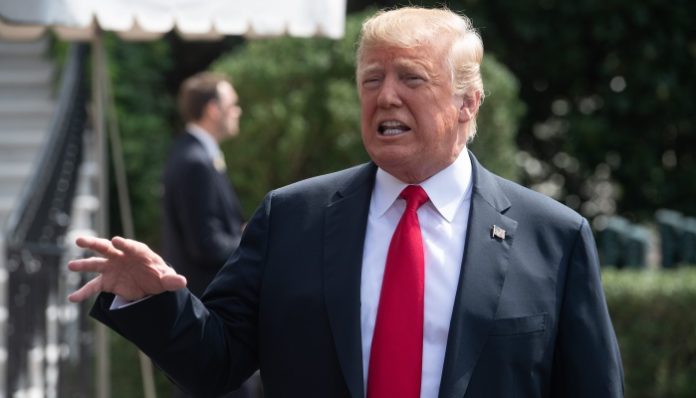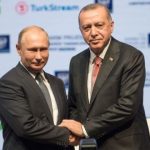President Recep Tayyip Erdogan’s drive to restore Turkey’s stature as an indispensable Middle Eastern power is colliding with his misplaced confidence in his own judgment.
Compounding that danger, Erdogan is feeding his hubris by surrounding himself with sycophants, who only tell him what he wants to hear.
The result is that a crisis in Turkey’s relationship with the United States over Erdogan’s decision to buy Russia’s top-of-the-line S-400 air defence system is fast approaching detonation point.
Washington says this deal is incompatible with Turkey’s membership of NATO. Embargoes are being prepared under the Countering America’s Adversaries Through Sanctions Act (CAATSA) that would further damage Turkey’s already faltering economy.
The sanctions would also automatically prevent Turkey from buying the 116 F-35 stealth fighter jets it plans to make the hub of its air force.
The Pentagon has already stopped the training of Turkish pilots at F-35 bases in the U.S. And unless there is a resolution, it will be necessary to remove Turkey’s role in the financing, development and manufacture of the aircraft.
The estimates are that the direct cost to Turkey would be approaching $20 billion while to spin off damage to an economy already in serious decline and roiled by inflation is unaccountable.
Not least of the Pentagon’s worries about having the F-35s deployed by Turkey alongside the S-400s is that this would allow Russia to scan the U.S.-designed warplanes for weaknesses and to make them vulnerable to attack by the Russian missiles.
After all, the S-400 is designed to overcome U.S. stealth technology.
There would likely also be efforts to restrict sales of other military equipment to Turkey, including spare parts for U.S.-made equipment already in Ankara’s arsenals.
These developments beg the immediate question of whether Turkey can continue as a member of NATO, of which it was a founding member and to which it contributes the second largest armed forces, after the U.S.
Sanctions would accelerate to Erdogan’s persistent moves since he came to power in 2003 to turn the focus of the country of 80 million people away from the West and towards the Middle East. This has been accompanied by the dismantling of Turkey’s strongly secular constitution and rebranding the country as something close to an Islamic state.
In the course of these moves, Erdogan has aligned himself with Russia, especially over response to the civil war in Syria, where Moscow is propping up the regime of President Bashar Assad, and Ankara frets over the growth of a regional movement for the establishment of a Kurdish state.
Erdogan has developed a close, personal relationship with Russian President Vladimir Putin, with whom he is said to meet and talk more frequently on the telephone than with any other world leader.
With Putin at his elbow, Erdogan may well achieve greater influence in the Middle East along with Saudi Arabia, Egypt and Iran. But that will finally kill Turkey’s on-off and already largely dormant efforts to join the European Union.
Yet Erdogan insists that none of this will happen — that there will be no pushback or sanctions from Washington.
He is basing this belief on a brief conversation he had with Donald Trump on the fringes of the G20 summit in Japan late last month. Erdogan claims Trump assured him there would be no sanctions, something that both Trump and U.S. officials refuted at the time.
However, Trump has been a lot more equivocal since. He does have the power to override or ignore the process started by a bipartisan group of senators last week to invoke the CAATSA.
What will determine Trump’s thumbs-up or -down decision when the time comes for him to decide on sanctions on Turkey is anyone’s guess. If the track record is any guide, Trump will do whatever seems expedient, attention-getting or a useful distraction from other problems.
Erdogan is unwise to wager so much of his own political credibility — recently damaged by opposition gains in municipal elections — and the economic and strategic future of his country on a few words from Trump.
But as Erdogan climbed from accountable prime minister to authoritarian president, he has increasingly assumed that other national leaders have the same untrammelled power.
This has prompted him to frame his foreign policy almost entirely around his personal relationship with other leaders rather than close examination of national interests.
This prejudice is reinforced by the people Erdogan chooses to have around him. They are fawning courtiers rather than serious advisers, especially on foreign policy.
Erdogan’s view of the U.S. in particular is framed by conspiracy theories and paranoia. Those fears may not be entirely out of place, but dealing with them needs a clear head and sound advice, neither of which Erdogan has on hand.
Erdogan’s relationship with Washington and Europe hit stormy seas in the mid 2000s as he engineered the remodelling of the Turkish administration from an accountable parliamentary system with an independent judiciary to a dominantly powerful presidency with himself at the helm.
Also at issue was the fallout from the two invasions of Iraq by the U.S., which resulted in a de-facto independent Kurdish state in northern Iraq. Erdogan fears this is a haven and an inspiration for the Kurds who dominate in Turkey’s eastern provinces.
But the breaking point with Washington was in 2013, when Erdogan fell out with his long-time political ally, Muslim cleric Fethullah Gülen, who fled to the U.S. Erdogan claims Gülen was behind an attempted military coup in 2016, and is outraged at Washington’s refusal to extradite him.
The Syrian civil war that started in 2011 gave Syrian Kurds effective control of much of the north of the country bordering Turkey. This became a major threat in Erdogan’s eyes in 2016 when Washington, in a policy taken up by Trump when he came to office in 2017, began arming and training the Kurds to fight the Islamic State Group that had established a “caliphate” in eastern Syria and northwestern Iraq.
Turkey’s desire for a modern air-defence system gestated as air power wielded by the Assad regime became a major element in the Syrian civil war next door. Ankara first asked Washington for agreement to purchase the Raytheon-manufactured Patriot system.
That never came to anything, and it remains unclear why. Ankara says it turned elsewhere after the Barack Obama administration refused to allow the transfer of the system’s missile technology ahead of the purchase.
Given Obama’s squeamishness about the Syrian civil war in general and the often duplicitous roles played by Ankara in particular, there may well have been reluctance to sell Turkey the Patriot system.
As a result, in 2015 Erdogan turned to China for air-defence missiles, but he quickly retreated when NATO expressed concerns about the security of the organization’s assets in Turkey.
However, Erdogan sees refusal and interference from Washington as an attempt to weaken and undermine Turkey. The government-dominated media constantly hammers away at this theme, also persistently underlining Washington’s support for the Syrian Kurds who are allied to the Turkish terrorist Kurdish Workers’ Party.
In December 2017, insisting that choosing the source of military hardware is a matter of national sovereignty, Erdogan announced the $3-billion purchase of two S-400 batteries from Russia.
The equipment began arriving on July 12, and Erdogan said on Tuesday the system will be fully deployed by April next year.
What happens next depends very much on the vagaries of Washington’s dysfunctional political system.
Erdogan has put his faith in what he believes was a promise from Trump, and that has never been a sound bet.
The views, opinions and positions expressed by all iPolitics columnists and contributors are the author’s alone. They do not inherently or expressly reflect the views, opinions and/or positions of iPolitics.
By Jonathan Manthorpe
Source: iPolitics



